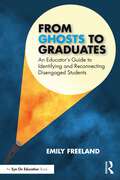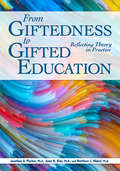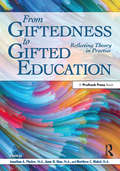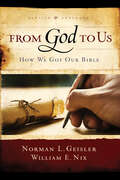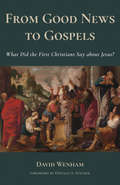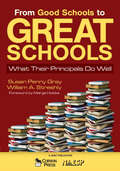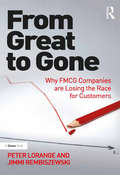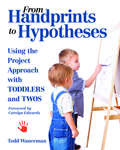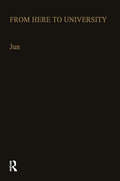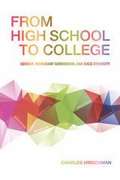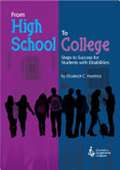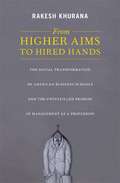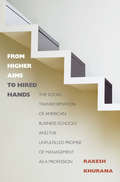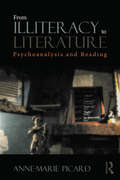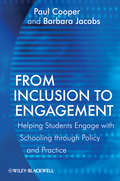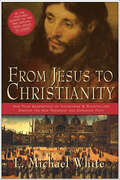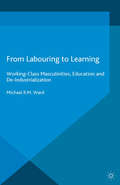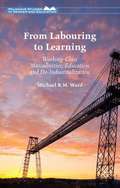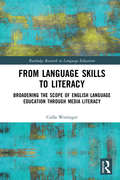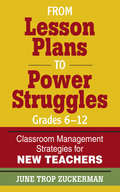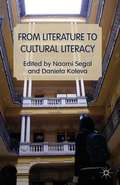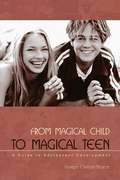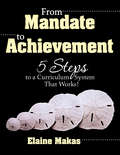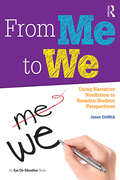- Table View
- List View
From Ghosts to Graduates: An Educator’s Guide to Identifying and Reconnecting Disengaged Students
by Emily FreelandFrom Ghosts to Graduates is a timely book that recognizes that three years of interrupted learning has created an impending dropout timebomb of students who are traditionally at risk, as well as those who became disengaged during pandemic learning. Many students are ghosts in the system – they have become disconnected and disenchanted with schooling. Instead of only addressing strategies to treat the symptoms of dropping out, this important resource addresses the causes of the disengagement that led to those symptoms. Author Emily Freeland shows how to identify existing and potential ghosts, how to reconnect students to the learning process and communicate that we see them and believe in them, how to overcome barriers to progress, and how to restore hope. Each chapter offers current research and practical strategies, as well as Do Now and Reflection sections to help you apply the ideas as you read. With the deliberate practices in this book, you’ll be able to change the trajectory of the ghosting trend and help more of your students be seen.
From Giftedness to Gifted Education: Reflecting Theory in Practice
by Jonathan Plucker Ann Rinn Matthew MakelGifted education and talent development have numerous theories and conceptions for how to identify and serve students. This book helps introduce and apply these ideas to help reflect theory in practice. Each chapter introduces readers to a different theory by providing definitions of key concepts, explaining the fundamental conceptual/theoretical approach, and concluding with advice on how the conception can be put into practice. Suggestions for further reading are also provided. Some chapters are based on theories that have been around for decades, and some have been developed more recently. But all chapters focus on helping empower readers to understand and take action without having to reinvent the wheel.
From Giftedness to Gifted Education: Reflecting Theory in Practice
by Jonathan A. Plucker Anne Rinn Matthew C. MakelThe fields of gifted education and talent development have numerous theories and conceptions for how to identify and serve students. This book helps introduce and apply these ideas to help reflect theory in practice. Each chapter introduces readers to a different theory by providing definitions of key concepts, explaining the fundamental conceptual/theoretical approach, and concluding with advice on how the conception can be put into practice. Suggestions for further reading are also provided. Some chapters are based on theories that have been around for decades, and some have been developed more recently. But all chapters focus on helping empower readers to understand and take action without having to reinvent the wheel.
From God To Us Revised and Expanded: How We Got Our Bible
by Norman L Geisler William E. NixWhere did the Bible come from? How do we know the right books are in the Bible? Does the Bible contain errors? What are the oldest copies we have of the Bible? How do we know that the Bible hasn't been changed over the years? Why are there so many translations of the Bible, and which one should I use? These are just some of the important questions about the Bible that are discussed in this book. Understanding basic facts about the origin of the Bible is essential for every Christian, but it can also be confusing and difficult. Here, two well-known scholars, authors of a more technical book, A General Introduction to the Bible, explain simply and clearly these basic facts. Inspiration, the biblical canon, major manuscripts, textual criticism, early translations, and modern versions are some of the major topics discussed. Careful explanations of important points are given throughout, as the entire field of biblical introduction is covered. Completely updated and revised edition of the 1974 work (more than 78,000 copies sold). Helpful charts have been added, along with an index of subjects, persons, and Scripture. This book is ideally suited for Bible students, pastors, and professors. While writing for readers without previous training, the authors do not gloss over difficult and complex issues when they arise. The nature of inspiration, the extent of the canon, and the usefulness of modern versions are all clearly discussed. The authors write: "The chain of communication from God to us is strong. It has several solid links: inspiration, collection, transmission, and translations. The strength of these links provide the contemporary Christian with the moral certitude that the Spirit-inspired original text of Scripture has been providentially preserved by God so that for all practical purposes the Bible in our hands is the infallible and inerrant word of God."
From God To Us Revised and Expanded: How We Got Our Bible
by Norman L Geisler William E. NixWhere did the Bible come from? How do we know the right books are in the Bible? Does the Bible contain errors? What are the oldest copies we have of the Bible? How do we know that the Bible hasn't been changed over the years? Why are there so many translations of the Bible, and which one should I use? These are just some of the important questions about the Bible that are discussed in this book. Understanding basic facts about the origin of the Bible is essential for every Christian, but it can also be confusing and difficult. Here, two well-known scholars, authors of a more technical book, A General Introduction to the Bible, explain simply and clearly these basic facts. Inspiration, the biblical canon, major manuscripts, textual criticism, early translations, and modern versions are some of the major topics discussed. Careful explanations of important points are given throughout, as the entire field of biblical introduction is covered. Completely updated and revised edition of the 1974 work (more than 78,000 copies sold). Helpful charts have been added, along with an index of subjects, persons, and Scripture. This book is ideally suited for Bible students, pastors, and professors. While writing for readers without previous training, the authors do not gloss over difficult and complex issues when they arise. The nature of inspiration, the extent of the canon, and the usefulness of modern versions are all clearly discussed. The authors write: "The chain of communication from God to us is strong. It has several solid links: inspiration, collection, transmission, and translations. The strength of these links provide the contemporary Christian with the moral certitude that the Spirit-inspired original text of Scripture has been providentially preserved by God so that for all practical purposes the Bible in our hands is the infallible and inerrant word of God."
From Good News to Gospels: What Did the First Christians Say about Jesus?
by Donald A. Hagner David WenhamThe good news of Jesus spread like wildfire through the Roman Empire in the decades between his death and the writing of the first gospels—but how? What exactly did the first Christians say about Jesus? In From Good News to Gospels David Wenham delves into the gospels, the book of Acts, and the writings of Paul to uncover evidence of a strong and substantial oral tradition in the early church. This book will inform, engage, and challenge readers, inspiring them to better understand and appreciate the earliest gospel message.
From Good Schools to Great Schools: What Their Principals Do Well
by Susan P. Gray William A. StreshlyMake the leap from ordinary to stellar school leadership! "What can I do to make a difference and lift my school to excellence?" Principals will find answers to this question and other critical leadership issues in this comprehensive resource, which examines how to apply lessons from the private sector to public education. The authors provide templates, implementation tips, and additional resources, and help school leaders discover nine essential characteristics of high-performing "Level 5" leaders through: In-depth discussions and case studies of "star" principals; A comparison of principals and corporate leaders, including qualities exclusive to school leadership; Reflection questions for more effective application of leadership principles.
From Great to Gone: Why FMCG Companies are Losing the Race for Customers
by Peter Lorange Jimmi RembiszewskiThe modern consumer is no longer attracted by single-minded, predictable and one-benefit-focused brand promises. The old-fashioned FMCG communication strategies based on television, radio and print with constant repetition have become outdated. From Great to Gone shows that what’s needed are ’Lego’ strategies, whereby the marketing and communication strategies are built up by many key facets (like building blocks) and delivered to the consumer through a mix of various touch points. Most importantly, you need to leave consumers to put all of that together themselves. There are major internal and external hurdles to transforming FMCGs successfully into FICGs - Fast Innovating Consumer Goods. It requires new brand strategies and flatter, more top-down than bottom-up, decision-making organisations and a 21st-century model for advertising agencies. Externally these companies need a new route to market through transformation of their old retail dependencies. Changes are also required in all communication delivery, reflecting modern consumers’ connectivity and unlimited access to information. In the book the authors showcase what the winners of the 21st century have in common that has enabled them to become FICGs. New, unimagined models continue emerge, to which, with the authors’ guidance producers and retailers may develop their own sustainable responses.
From Handprints to Hypotheses
by Todd WanermanCreativity, initiative, and inquiry are important in all children's early education, including toddlers and two-year-olds. This book focuses on using the project approach-a teaching strategy that enables educators and caregivers to guide children through in-depth studies of real world topics-to scaffold very young children's early learning. It provides information on creating sensory-based experiences-developmentally appropriate for toddlers and twos-that bring new perspectives and activities into the classroom.Todd Wanerman has been teaching toddlers and twos for twenty years. He is the coauthor of Including One, Including All.
From Here to University: Access, Mobility, & Resilience Among Latino Youth (RoutledgeFalmer Studies in Higher Education)
by Alexander JunFrom Here to University examines factors leading to successful college preparation and academic mobility for historically underrepresented, low-income, inner-city youth. Alexander Jun analyzes theories of social and cultural capital, as well as the effects of incorporating family and community involvement on college preparation. The text proposes a framework of college preparation factors that requires a comprehensive and culturally responsive approach, affirming local identities and incorporating active participation of families to ensure long-term success. The book concludes with implications for educators who might administer programs in order to help identity factors that lead to programmatic success.
From High School to College: Gender, Immigrant Generation, and Race-Ethnicity
by Charles HirschmanToday, over 75 percent of high school seniors aspire to graduate from college. However, only one-third of Americans hold a bachelor’s degree, and college graduation rates vary significantly by race/ethnicity and parental socioeconomic status. If most young adults aspire to obtain a college degree, why are these disparities so great? In From High School to College, Charles Hirschman analyzes the period between leaving high school and completing college for nearly 10,000 public and private school students across the Pacific Northwest. Hirschman finds that although there are few gender, racial, or immigration-related disparities in students’ aspirations to attend and complete college, certain groups succeed at the highest rates. For example, he finds that women achieve better high school grades and report receiving more support and encouragement from family, peers, and educators. They tend to outperform men in terms of preparing for college, enrolling in college within a year of finishing high school, and completing a degree. Similarly, second-generation immigrants are better prepared for college than first-generation immigrants, in part because they do not have to face language barriers or learn how to navigate the American educational system. Hirschman also documents that racial disparities in college graduation rates remain stark. In his sample, 35 percent of white students graduated from college within seven years of completing high school, compared to only 19 percent of black students and 18 percent of Hispanic students. Students’ socioeconomic origins—including parental education and employment, home ownership, and family structure—account for most of the college graduation gap between disadvantaged minorities and white students. Further, while a few Asian ethnic groups have achieved college completion rates on par with whites, such as Chinese and Koreans, others, whose socioeconomic origins more resemble those of black and Hispanic students, such as Filipinos and Cambodians, also lag behind in preparedness, enrollment, and graduation from college. With a growing number of young adults seeking college degrees, understanding the barriers that different students encounter provides vital information for social scientists and educators. From High School to College illuminates how gender, immigration, and ethnicity influence the path to college graduation.
From High School to College: Steps to Success for Students With Disabilities
by Elizabeth HambletCollege is a different world from high school and the laws, expectations, and culture around disability services and accommodations are different, too. Elizabeth Hamblet, a Columbia University Learning Specialist/Consultant and recognized transition speaker and writer, has written a one-of-a-kind, step-by-step guide that is an essential resource for college-bound students, their families, and the special educators and school counselors who work with them.
From Higher Aims to Hired Hands: The Social Transformation of American Business Schools and the Unfulfilled Promise of Management as a Profession
by Rakesh Khurana"I have been waiting for years for someone to write the definitive institutional history of U. S. management education, and this is it. From the standpoint of most analytic definitions of 'professional,'the term 'professional manager' is enigmatic, even oxymoronic. Rakesh Khurana's thorough, insightful, provocative, and courageous history of business education explains how this term came to make practical and cultural sense to a generation of Americans, and how its logic has been undermined in the past thirty years. "From Higher Aims to Hired Hands" is an exemplary work of institutional analysis, combining first-rate historiography with outstanding social-science scholarship. It will be essential reading for business historians, students of management and organizations, and faculty, administrators, and thoughtful students at America's business schools. "--Paul DiMaggio, Princeton University" "From Higher Aims to Hired Hands" is a tour de force. With profound depth and sweeping scope, Rakesh Khurana analyses the rise and potential fall of a uniquely American institution--one that has influenced management education throughout the world. His book contributes significantly to explaining how managerial capitalism could go awry and how to restore the moral underpinnings that would make management the profession of leadership. In addition to offering fascinating history lessons based on exhaustive research, Khurana adds new twists to institutional theory and points to future directions for educational practice. "--Rosabeth Moss Kanter, Harvard Business School, author of "The Change Masters, Confidence," and "America the Principled: 6 Opportunities for Becoming a Can-Do Nation OnceAgain" "This panoramic portrait of the origins and ramifications of American business education is quite remarkable, rich in detail, powerful in the marshaling of evidence, and provocative in its claims. Khurana writes with confidence, authority, and erudition. "--Walter Powell, Stanford University "This is a wonderful and important book for anyone interested in business education. There is a tendency for those of us involved in business education to think that we understand the dynamics of our industry and that there is little new that we can learn. How wrong such a judgment would be. In providing a sociological understanding of the origins of business education and the professionalization of management, this book prompts deep reflection about the state of management today and offers real insight into the challenges of elevating the standards of this particular profession. "--Joel Podolny, dean of Yale School of Management
From Higher Aims to Hired Hands: The Social Transformation of American Business Schools and the Unfulfilled Promise of Management as a Profession
by Rakesh KhuranaIs management a profession? Should it be? Can it be? This major work of social and intellectual history reveals how such questions have driven business education and shaped American management and society for more than a century. The book is also a call for reform. Rakesh Khurana shows that university-based business schools were founded to train a professional class of managers in the mold of doctors and lawyers but have effectively retreated from that goal, leaving a gaping moral hole at the center of business education and perhaps in management itself. Khurana begins in the late nineteenth century, when members of an emerging managerial elite, seeking social status to match the wealth and power they had accrued, began working with major universities to establish graduate business education programs paralleling those for medicine and law. Constituting business as a profession, however, required codifying the knowledge relevant for practitioners and developing enforceable standards of conduct. Khurana, drawing on a rich set of archival material from business schools, foundations, and academic associations, traces how business educators confronted these challenges with varying strategies during the Progressive era and the Depression, the postwar boom years, and recent decades of freewheeling capitalism. Today, Khurana argues, business schools have largely capitulated in the battle for professionalism and have become merely purveyors of a product, the MBA, with students treated as consumers. Professional and moral ideals that once animated and inspired business schools have been conquered by a perspective that managers are merely agents of shareholders, beholden only to the cause of share profits. According to Khurana, we should not thus be surprised at the rise of corporate malfeasance. The time has come, he concludes, to rejuvenate intellectually and morally the training of our future business leaders.
From Illiteracy to Literature: Psychoanalysis and Reading
by Anne-Marie PicardFrom Illiteracy to Literature presents innovative material based on research with ‘non-reading’ children and re-examines the complex relationship between psychoanalysis and literature, through the lens of the psychical significance of reading: the forgotten adventure of our coming to reading. Anne-Marie Picard draws on two specific fields of interest: firstly the wish to understand the nature of literariness or the "literary effect", i.e. the pleasures (and frustrations) we derive from reading; secondly research on reading pathologies carried out at St Anne’s Hospital, Paris. The author uses clinical observations of non-reading children to answer literary questions about the reading experience, using psychoanalytic theory as a conceptual framework. The notion that reading difficulties or phobias should be seen as a symptom in the psychoanalytic sense, allows Picard to shed light on both clinical vignettes taken from children’s case histories and reading scenes from literary texts. Children experiencing difficulties in learning to read highlight the imaginary stakes of the confrontation with the arbitrary nature of the letter and the "price to pay" for one’s entrance into the Symbolic. Picard applies the lesson "taught" by these children to a series of key literary texts featuring, at their very core, this confrontation with the signifier, with the written code itself.. This book argues that there is something in literature that drives us back, again and again, to the loss we have suffered as human beings, to what we had to undergo to become human: our subjection to the common place of language. Picard shows complex Lacanian concepts "at work" in the field of reading pathologies, emphasizing close reading and a clinical attention to the "letter" of the texts, far from the "psychobiographical" attempts at psychologizing literary authors. From Illiteracy to Literature presents a novel psychodynamic approach that will be of great interest to psychotherapists and language pathologists, appealing to literary scholars and those interested in the process of reading and "literariness."
From Inclusion to Engagement
by Paul Cooper Barbara JacobsFrom Inclusion to Engagement challenges the ideologically driven academic discourse that has come to dominate inclusive education by presenting research-based knowledge about what actually works.Presents an innovative approach rooted in a biopsychosocial theoretical perspective - an approach that is still relatively misunderstood within the educational sphereOffers insights based on an extensive review of contemporary international research in the fieldAvoids the biases of ideology in favour of science-based social and educational outcomesThe first comprehensive account of evidence-based interventions for students with Social, Emotional and Behavioural Difficulties
From Jesus to Christianity: How Four Generations of Visionaries & Storytellers Created the New Testament and Christian Faith
by L. Michael WhiteL. Michael White, one of the world’s foremost scholars on the origins of Christianity, provides the complete, astonishing story of how Christianity grew from the personal vision of a humble Jewish peasant living in a remote province of the Roman Empire into the largest organized religion in the world.Rather than reading the New Testament straight through in its traditional, or “canonical” order, From Jesus to Christianity takes a historical approach. Looking at the individual books chronologically, in the sequence in which they were actually written, readers can see what they divulge about the disagreements, shared values, and unifying mission of the earliest Christian communities. White digs through layers of archaeological excavations, sifts through buried fragments of largely unknown texts, and examines historical sources to discover what we can know of Jesus.
From Labouring to Learning: Working-Class Masculinities, Education and De-Industrialization (Palgrave Studies in Gender and Education)
by Michael R.M. WardHighly Commended in the Society of Educational Studies Book PrizeThis book explores how economic changes and the growing importance of educational qualifications in a shrinking labour market, particularly effects marginalized young men. It follows a group of young working-class men in a de-industrial community and challenges commonly held representations that often appear in the media and in policy discourses which portray them as feckless, out of control, educational failures and lacking aspiration. Ward argues that for a group of young men in a community of social and economic deprivation, expectations and transitions to adulthood are framed through the industrial legacy of geographically and historically shaped class and gender codes. These codes have an impact on what it means to be a man and what behaviour is deemed acceptable and what is not.
From Labouring to Learning: Working-Class Masculinities, Education and De-industrialization (Palgrave Studies in Gender and Education)
by Michael R.M. WardThis book explores how economic changes and the growing importance of educational qualifications in a shrinking labour market, particularly effects marginalized young men. It follows a group of young working-class men in a de-industrial community and challenges commonly held representations that often appear in the media and in policy discourses which portray them as feckless, out of control, educational failures and lacking aspiration. Ward argues that for a group of young men in a community of social and economic deprivation, expectations and transitions to adulthood are framed through the industrial legacy of geographically and historically shaped class and gender codes. These codes have an impact on what it means to be a man and what behaviour is deemed acceptable and what is not.
From Language Skills to Literacy: Broadening the Scope of English Language Education Through Media Literacy (Routledge Research in Language Education)
by Csilla WeningerThe narrowing of English language education curriculum in many contexts has negatively impacted classroom teaching and learning. High-stakes standardized testing, scripted curricula, and the commodification of English have converged to challenge socially meaningful classroom literacy instruction that promotes holistic development. Although in different ways, these factors have shaped the teaching of English as both first and second language. How can English educators respond? This book argues that the first step is to take account of the broader policy, political and cultural landscape and to identify the key constraints affecting teachers, students and parents. These will set the broad parameters for developing local pedagogic approaches, while still recognizing the constraints that actively push against them. Using Singapore English language teaching as a case study, this book illustrates how this process can unfold, and how media literacy principles were vernacularized to design English classroom pedagogies that stretched the bounds of what is acceptable and possible in the local context.
From Lesson Plans to Power Struggles, Grades 6–12: Classroom Management Strategies for New Teachers
by June Trop ZuckermanStraight talk about classroom management from new teachers who have developed solutions! Offering authentic stories from novice secondary school teachers in urban, suburban, and rural districts with diverse students, this practical guide illustrates how new teachers can benefit from the experiences of their peers to resolve common classroom challenges. The author provides instructional and disciplinary cases, plus an expert analysis of each teacher’s successful strategies. The book includes: A table of contents with specific instructional/discipline topics for easy reference, Ways to identify when problems are related to lesson delivery or discipline, A glossary of terms and a resource list for detailed information.
From Literature to Cultural Literacy
by Naomi Segal Daniela KolevaIn current contexts one can be a literary scholar and yet be working on objects other than poems, dramas or fiction. Something has happened to both the researchers and the discipline that has transformed this humanities domain, bringing it into a sharper focus to investigate the readability of contemporary social issues. The essays in this book, written by scholars from ten countries, range across this research domain, renamed 'literary-and-cultural studies', or LCS. LCS depends on four key concepts textuality, fictionality, rhetoricity and historicity which characterize both the material and the methods of their research. The 16 essays look at four broad fields: cultural memory; migration and translation; electronic textuality; and biopolitics, biosociality and the body. The aim of the collection is to deploy and enhance cultural literacy, a way of looking at social and cultural issues especially issues of change and mobility through the lens of literary thinking. "
From Magical Child to Magical Teen: A Guide to Adolescent Development
by Joseph Chilton PearceA groundbreaking perspective on Nature's plan for full human creativity and intelligence during the teen years• Shows what is at the core of today's serious social and psychological problems• Explores the sexual and spiritual stage of adolescent development• Details the connection between adolescent brain and heart development and the issue of nature vs. nurture• By the author of Magical Child (250,000 copies sold)Something is supposed to happen during the adolescent years--something greater than MTV, video games, and the Internet. Joseph Chilton Pearce describes this something as the natural mandate for post-biological development--the development of the sexual and spiritual senses and expansion of our growth process outside of our bodies and into the physical world that surrounds us.Though first written in the mid 1980s, the message of From Magical Child to Magical Teen is even more compelling and helpful today--especially for those who live with and work with adolescents. Drawing on the stages of development outlined by Swiss biologist Jean Piaget and the brain research of neuroscientist Paul MacLean, Pearce demonstrates how nature has built into us an agenda for the intelligent unfolding of our lives. He offers a powerful critique of contemporary child-rearing practices and a groundbreaking alternative to existing perspectives on adolescence so we can unleash our greatest potential, as well as that of our children, in order to experience our fullness in the manner nature intended all along.
From Mandate to Achievement: 5 Steps to a Curriculum System That Works!
by Elaine Makas HowardBased on a five-step model, this guide helps school leaders establish the processes necessary to align curriculum to mandated standards, develop curriculum maps, and systematize instructional practices.
From Me to We: Using Narrative Nonfiction to Broaden Student Perspectives
by Jason GriffithWith this practical book, you’ll learn effective ways to engage students in reading and writing by teaching them narrative nonfiction. By engaging adolescents in narrative, literary, or creative nonfiction, they can cultivate a greater understanding of themselves, the world around them, and what it means to feel empathy for others. This book will guide you to first structure a reading unit around a narrative nonfiction text, and then develop lessons and activities for students to craft their own personal essays. Topics include: Engaging your students in the reading of a nonfiction narrative with collaborative chapter notes, empathy check-ins, and a mini-research paper to deepen students’ understanding; Helping your students identify meaningful life events, recount their experiences creatively, and construct effective opening and closing lines for their personal essays; Encouraging your students to use dialogue, outside research, and a clear plot structure to make their narrative nonfiction more compelling and polished. The strategies in this book are supplemented by examples of student work and snapshots from the author’s own classroom. The book also includes interviews with narrative nonfiction writers MK Asante and Johanna Bear. The appendices offer additional tips for using narrative nonfiction in English class, text and online resources for teaching narrative nonfiction, and a correlation chart between the activities in this book and the Common Core Standards.
